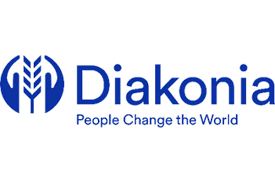Location
SE-167 14 Bromma
SWEDEN
Diakonia is an international development organization with Christian values that works together with local partner organizations for sustainable change for the most vulnerable people in the world.
Diakonia is a faith-based Swedish development organization. We support and work with around 350 local partner organizations in 25 countries. Together with our partner organizations, we form a global network that works to ensure that more people are able to live dignified lives.
Members:
Resources
Displaying 11 - 15 of 23NRC Sudan 2022-26
General
The overall objective of the intervention is to foster safe, sustainable, and dignified living conditions for displacement-affected communities prone to conflict over natural resources and due to inadequate adaptable and diversified livelihood options resulting in additional barrier in accessing basic services. The project will be implemented in South Kordofan State and North Darfur State.
Objectives
The overall objective of the CASPIR project is to provide improved safe, sustainable, and dignified living conditions for displacement-affected communities as result of enhanced, diversified, and more adaptable livelihoods productivity due to inclusive, efficient land governance. The overall goal of the project is to improve the living conditions of communities in South Kordofan and North Darfur fostering diversification and adaptability of livelihoods systems through efficient, sustainable, and inclusive natural resources governance, with specific focus on land. In order to achieve the objectives, the project is designed along two long-term outcomes: Outcome 1: Increased peaceful co-existence among targeted communities as result of reduced conflicts over natural resources; and Outcome 2: Increased sustainability and adaptability as well as diversification of livelihoods options among the targeted communities.
Capacity Development in Land Management Rwanda 2022-2027 - Capacity Building in Land Management Rwanda 2022-20
General
The programme Capacity Development in Land Management in Rwanda, with an activity period 2022-2027, is to a large extent a continuation of an ongoing support to the Swedish Mapping, Cadastre and Land Registration Authority (Lantmäteriet) for its collaboration and support to Rwanda National Land Authority (NLA). The programme will contribute to a transparent, reliable, and accountable land management is driving the socio-economic transformation towards a sustainable future for all Rwandans. The expected outcomes of the intervention is 1. Project Management: NLA is a leading sustainable land management organization, driving coordination between key stakeholders contributing to sustainable socio-economic and environmental development for all Rwandans. 2. Land Administration: Land Administration in Rwanda is based on principles of transparency, efficiency, gender equality, accessibility and accountability and can accommodate social, legal and technological changes to deliver customer centred services to all Rwandans. 3. Surveying, Mapping and GIS: Capable staff and sustainable systems providing accurate, standardized and accessible geo-spatial information, services and products, contributing towards the socio-economic development in Rwanda. 4. Land Use Planning: Efficient land use management in Rwanda through development, implementation, monitoring and awareness of City of Kigali and Districts Land Use Master Plans, which are in compliance with the National Land Use and Development Master Plan 2020-2050 (NLUDMP).
Objectives
The programme will contribute to that transparent, reliable, and accountable land management is driving the socio-economic transformation towards a sustainable future for all Rwandans. The expected outcomes of the programme are: Programme Management: NLA is a leading sustainable land management organization, driving coordination between key stakeholders contributing to sustainable management of land for socio-economic development for all Rwandans. Land Administration: Land Administration in Rwanda is based on principles of transparency, efficiency, gender equality, equity, accessibility, and accountability and can accommodate social, legal and technological changes to deliver customer centered services to all Rwandans. Surveying, Mapping and GIS: Capable staff and sustainable systems providing accurate, standardized, and accessible geo-spatial information, services, and products, contributing towards the socio-economic development in Rwanda Land Use Planning: Efficient land use management in Rwanda through development, implementation, monitoring and awareness of City of Kigali and Districts Land Use Master Plans, which are in compliance with the National Land Use and Development Master Plan 2020-2050 (NLUDMP)
How tree cover affects groundwater resources across African tropical drylands
General
An estimated 80% of the global population lack secure water resources. Many also lack ready access to fuel wood and other tree derived benefits. However, the current scientific paradigm says that we must choose which problem to solve as increasing tree cover always reduces water availability. Consider the costs if this thinking is wrong. In Africa, 175 M ha of degraded lands are judged suitable for tree planting which could significantly enhance people’s livelihoods. Our previous research in the seasonally dry tropics indicates that an intermediate tree cover can often improve groundwater recharge. This need testing on a larger scale, but if confirmed will upend the prevailing view in hydrology and have profound implications for policies affecting millions of livelihoods and the environment. Thus, the aim of this project is to provide evidence for better policies and management that will benefit poor people in drylands by evaluating the novel “optimum tree cover theory” for groundwater recharge across African drylands. The project involves four leading institutions; SLU, ICRAF, WU and NMBU. We will use the Land Degradation Surveillance Framework; a unique dataset that is available across Africa. It consists of multiple variables, including tree cover and key soil variables. We will do complementary strategic measurements of soil water flow and tree water use to model groundwater recharge as a function of tree cover under common conditions of the seasonally dry tropics.
Redesign of proposal Lantmäteriet - Revision redesign
General
The Swedish Land administration authority, Lantmäteriet, is with this small intervention given the assignment to redisgn their ITP proposal, and to integrate a thorough gender perspective into the design, with the support of a consultant.
Redesign of proposal Lantmäteriet - Redesign
General
The Swedish Land administration authority, Lantmäteriet, is with this small intervention given the assignment to redisgn their ITP proposal, and to integrate a thorough gender perspective into the design, with the support of a consultant.


